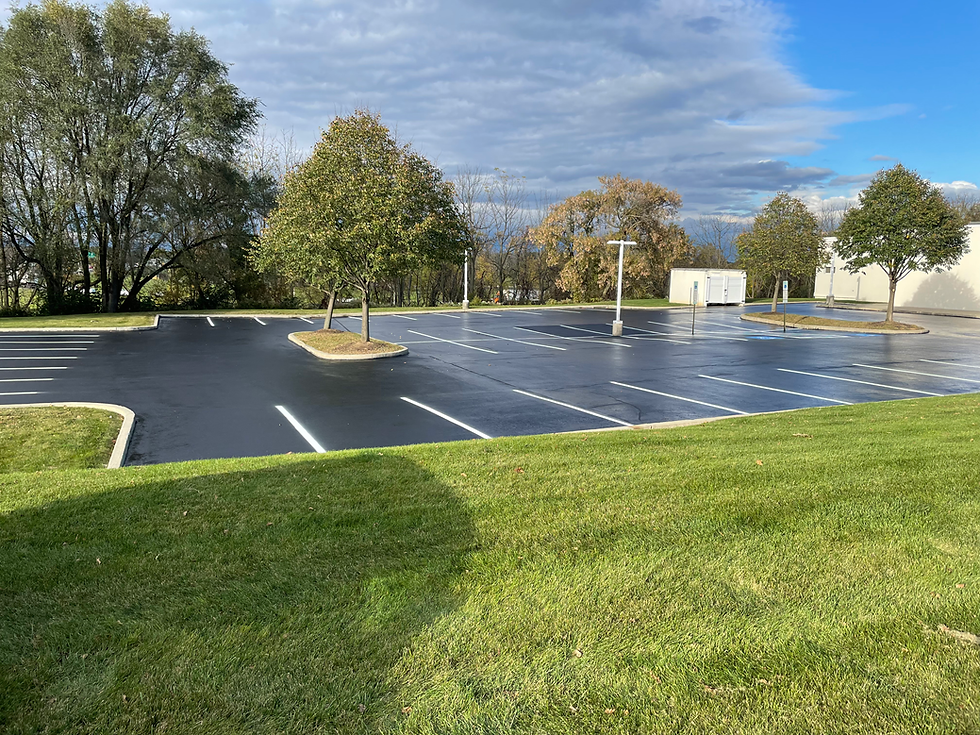What to Know About Asphalt Sealcoating
- Hick's Paving
- Mar 25, 2024
- 3 min read
If you have an asphalt driveway, parking lot, or other pavement, it’s important to understand the world of good that asphalt sealcoating brings.
As the asphalt surface is a significant investment, it’s essential to know how to keep it in prime condition, which is why sealcoating is critical.

What is asphalt sealcoating?
Asphalt sealcoating is the process of applying a protective layer to cover the surface of the asphalt to protect it against premature damage. It works by warding off moisture and harmful chemicals such as ice-melting salt, gas, and oil that reduce asphalt lifespan.
In addition to its protective properties, asphalt sealcoating acts as an aesthetic finish for your pavement, keeping it looking great and as good as new over time.
Types of asphalt sealcoating
There are a few options to choose from:
Slurry sealcoating: This works well for pavements with minimal wear and tear. It’s a mix of water, asphalt emulsion, and fine sand.
Chip sealcoating: This involves combining the sealant mixture and rock aggregates to strengthen the asphalt surface. It is excellent for severely damaged pavements.
Fog sealcoating: This works well for pavements that see a lot of traffic and contains emulsified asphalt bitumen sprayed in a fine mist on the surface of the pavement
Guidelines for asphalt sealcoating
Here are some things to keep in mind to get the best out of your asphalt sealcoating:
Patch large cracks before sealing.
Apply the sealant when the temperature is higher than 50 degrees Fahrenheit and rain isn’t expected for at least a day or two.
Clean the pavement with a detergent and spray it down with water before sealing.
After sealing, leave the pavement undisturbed for about a day or two
How often should you seal coat your driveway?
The frequency of the sealcoating depends on your climate and the condition of your pavement. If you live in a temperate region, you’ll need to seal your coat more regularly than if yours was a drier, milder climate.
Generally, it’s recommended that you seal coat your driveways once every two to three years. However, you should also check for signs like cracks, graying, and weathering. If you see evidence of these in your driveway, an annual sealcoating may be required.
Why asphalt sealcoating is essential for your pavement
Here are some reasons you should apply sealcoating for your asphalt pavements:
Slows down oxidation
Sealcoating slows oxidation, a natural process caused by the sun’s rays that dry out the bitumen, leaving the pavement brittle, faded, and susceptible to cracks.
Keeps water from seeping into cracks
While cracks are unavoidable with asphalt driveways, sealcoating can help fill in newly emerging or big cracks, keeping moisture from seeping in and damaging the base of the asphalt installation.
Protection from the impact of fuel spillage
The occasional oil spillage on the asphalt can soften and weaken it. Sealcoating protects against chemical damage and keeps the fuel from binding to the asphalt surface.
Prevents cracking under pressure
Asphalt is highly malleable and caves under pressure from heavy automobiles over time. Without sealcoating, this natural caving of the asphalt in response to pressure leads to cracks, which, when they widen, become a problem on your driveway.
Keep your asphalt pavement beautiful and long-lasting with sealcoating
Asphalt sealcoating can keep your pavement long-lasting and looking as good as new. However, it is best left to the professionals, which is why you should reach out to an expert asphalt company.
Whether you want to seal your driveway or parking lot, no matter the size of the project, we can help, guaranteeing a sturdy, beautiful pavement you can rely on for years. Get an estimate today.





